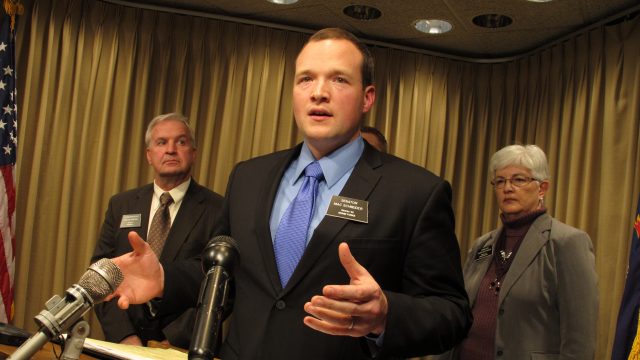North Dakota Democrats Want Revenue Chaos For The Sake Of Partisan Advantage

Senator Lonnie Laffen (R-Grand Forks) submitted an op/ed to SAB and elsewhere taking aim at Democrats for opposing reform of the state’s oil taxes. Republicans sought to reform oil taxes to lower the top rate in exchange for getting rid of two tax exemptions which trigger with lower oil prices.
I’ve written at-length about these tax triggers which create a huge amount of uncertainty for policymakers who must make decisions on appropriations and tax relief based on projected revenue numbers. The impact of those triggers could measure in the billions. Even the possibility that they’ll hit throws the budgeting process into chaos.
Laffen blamed Democrats for politicizing the issue, turning it into a handout for big oil instead of a fiscally responsible flattening of oil taxes. Senate Minority Leader Mac Schneider fires back in a smug response today patting his super-minority Democrats on the back for killing the reforms:
Laffen also states that my Dem-NPL colleagues and I “forced” the GOP majority to abandon SB 2336. I’m tempted to accept this charge as high praise for turning back such flawed policy, but the truth is that the GOP has 2/3 of the seats in both chambers of the Legislature. If SB 2336 was good policy, the supermajority would have passed it. It’s not like they didn’t have the votes.
Ultimately, the majority concluded that permanently forgoing billions and billions of dollars in reduced oil extraction tax revenue in exchange for removal of oil tax incentive triggers — which might result in temporary loss of revenue in down times — was not a good deal for the state. I appreciate that they came around to that view.
We extend a hand to Laffen and our friends in the majority and pledge to work for solutions which preserve our state’s budget and sensibly assist the oil industry if needed to promote continued investment in North Dakota during this dip in the market. But if the majority offers a proposal that would result in a loss of billions of dollars that should be used to fix rutted roads, strengthen education, and invest in future generations of North Dakotans, we will once again politely say, “no thanks.”
It’s hard to understand why Democrats are so opposed to reform the tax code to ensure that revenue streams are more stable. Schneider bemoans the loss of revenues from lowering the top rate, but in recent bienniums the state has had more money than it knows what to do with. Is it really so unfathomable that we might give the industry driving most of that revenue growth a modicum of relief? Especially in return for axing tax triggers that create so much uncertainty in the budget?
I suspect that Schneider and his fellow Democrats are motivated not so much by a desire for sound fiscal policy, but a desire to foment chaos. After all, being in the super-minority means never having to take responsibility for anything. If the state budget descends into chaos because these oil tax triggers hit, Democrats can blame Republicans and seek to take advantage for partisan game.
It’s cynical, partisan politics. Democrats would never admit it, but it’s true: What hurts North Dakota right now benefits them politically.
I’ve had several conservative friends ask me why I’m so concerned about the state losing revenue. After all, limited government conservatives aren’t supposed to support the maximization of state revenues, and aren’t tax exemptions a good thing? My answer is that taxes should be flat and simple.
Our oil taxes are neither. Reforms considered in 2013 would have flattened the oil and gas taxes, and made them more predictable for both the state and the industry. The state is now facing a huge amount of revenue uncertainty because those reforms failed.
Republicans deserve some blame in that they didn’t force the issue with their majority. But Democrats deserve blame too, especially now that they’re doubling down.




